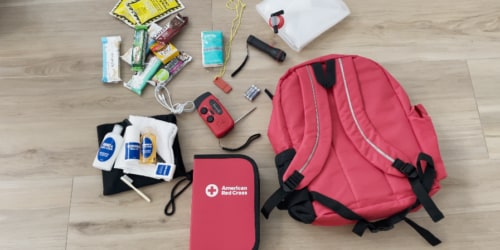I was honored to deliver a commencement speech June 4 at the University of Washington’s Foster School of Business undergraduate graduation ceremony. What an incredible day to celebrate with the amazing, determined and resilient graduates of the Class of 2023! They persevered to reach this important milestone despite a once-in-a-generation pandemic that changed everything about how we learned, worked and lived life.
Looking out at their faces, what struck me the most is that change is upon them again. From this moment on, no one is prescribing their path for them or what success will look like. So, I was excited to put myself in their shoes and offer up some advice I’ve grown to live by in my career, along with some real-world advice that they don’t teach you in college!
Here’s what I shared:
Good afternoon, everyone! Thank you for the great introduction, Dean Hodge. Graduates, and your families and supporters, thank you for giving us a reason to come together to celebrate today — and congratulations!
I remember sitting in your chair. You’re probably feeling ALL the emotions: Excited. Proud. Relieved. Nervous. Maybe a little Uncertain. (By the way, if you put yourself out there, those nervous feelings never go away — I’m pretty sure I just experienced them again stepping up here today!)
Preparing for this day took me back to my own graduation milestone … and how it feels. And I realized this, right here, today — is the first time in our lives no one is telling us what comes next, or even how to define our own success.
Think about it: Up until now, 11th grade followed 10th grade. Senior year followed junior year. There were even specific steps you had to take to be successful, like to gain admission to the incredible Foster School at the University of Washington. And once you were here, you completed every prescribed requirement to make it to graduation day.
Other people told you what success looked like. OTHER people decided YOUR success criteria. Get good grades, good scores, get involved in your school community, maybe pursue athletics or the arts. Pass each grade with success in these areas, and progress to the next. Year after year until this very moment.
Now, in a few short minutes, they’re gonna open those doors, release us into the world, and for the first time in your lives, there’s no path. There’s no prescribed definition of success. It’s COMPLETELY up to you. Your adult post-graduate life is a completely blank sheet of paper with no boxes on it to check off.
It’s exhilarating and sort of daunting all at the same time, isn’t it? I felt it when I graduated for sure, but also SO many times during my career. This feeling of not knowing the path ahead never goes away, so you might as well get used to it — and even learn to embrace it!
I know I felt it again when I joined T-Mobile almost 11 years ago. Back then, T-Mobile was a struggling #4 provider in the U.S. and was rapidly shrinking. It was a company without a clear path ahead. Seems like a great time to join a company, huh? I got there and thought, I really know how to pick ’em, you know?
I distinctly remember that feeling of, “OK, so what the heck do we do now?” during a time when very little that was happening was working. We knew we needed to make some changes pretty fast. So, what did we do?
We got curious. We listened to customers who were angry at our whole industry, and we made some big changes to show them we’d be a company that would put them first — in an industry famous for the opposite back then. We took smart risks and made some audacious moves. Fast forward just one decade, and we’ve gone from a distant #4 in the U.S.A. to, at the end of last year, the world’s largest telecommunications company of any kind by market cap. It’s been just a remarkable journey, and you know what?
We got here by constantly asking two simple questions that probably apply to each of us sitting here today. The questions are: “What if?” and “Why not?” What if? And why not? WHAT IF we eliminated data buckets and went all-in on Unlimited plans? WHY NOT give customers a free thank-you every single Tuesday with T-Mobile Tuesdays? What IF we allowed customers to roam with their phones worldwide for free?
And in providing ourselves the answers, we figured out what we were good at — which is loving customers and changing an industry in their favor — then doubled down on it. Love is a funny word for a company to use. But it applies, because we put ourselves out there, hoping customers would reciprocate and love us back. And it has worked out pretty well so far.
And today, as graduates, you’re at a similar crossroads. For the first time, you have the complete freedom to ask “What if” and “Why not” every day, to chart your course, and to define what success looks like to YOU.
Now, some of you might already have a sense of where you’re initially headed — you have accepted a job, you might be getting involved in the community, you might be pursuing another degree, or you might be looking for a job. And if you’re anything like I was as a new graduate, you may not be sure you’ve made the best choice for this next chapter. Or you may not have made a choice at all, and that’s OK! What’s pretty great, and a little scary, is that the choices are yours, and yours alone, to make.
But this is a commencement speech, and that means two things. First, even though the choices ahead are all yours, I’m going to give you some pearly bits of wisdom from an old Gen Xer. And second, SINCE it’s a commencement speech, you’ll almost surely have forgotten those pearly bits by tomorrow.
So, I revert to, “Hey listen, it’s up to you, just follow your gut.” Well actually, that’s if your gut is curious about what you are good at. Because my real advice is to follow your competence. That’s my first pearly shiny bit of wisdom. Follow your competence. Figure out what you enjoy, because you are good at it, and then do more of it. I’ll come back to that one.
The second? Don’t worry about it. Really. If you are wondering if your first thing out of school will take you in the right direction, I’m here to tell you not to sweat it. Because the journey is all about figuring it out.
Try to remember this for the sake of your own mental health. You can spend the entire next decade exploring what you enjoy doing — and what you are good at — and still not fall behind. I know, I know, we’re all type-A business students who overthink everything. But I mean it. We all put so much pressure on ourselves and think, man, this first thing right out of school … right now … is going to determine the whole road ahead. I better get this exactly right. And you know what? It’s just not the case.
There are SO many examples to back me up on this. Successful people who discovered their thing in their 30s and 40s. Today, you already have a solid sense of your own strengths and what you like doing … and your first step will help reaffirm that. But if not, you’ll just try again … and that’s OK, too!
Now let me go back to following your competence. Some people may tell you to just “follow your passions,” but I think that’s only part of the answer, because we often learn our passions over time.
Here’s the thing — I know people who are really great tax attorneys. Do you think they were passionate about taxes in college? I started my career marketing toothpaste. Let me tell you, I didn’t go into toothpaste because it was my passion. I went into it because I had a sense that I might be GOOD AT — and enjoy — marketing, and the company I went to was an ideal place to develop marketing skills. I’m pretty sure the best tax attorneys are people who discovered that the math and logic of it, or the client advocacy, were things they could thrive in. And you know what? Thriving is enjoyable. Most people I know who have found true career satisfaction have discovered something they’re good at. They have followed their competence. And it became a passion.
When we do more of the stuff we’re good at, we find ourselves getting better and better. We feel satisfied. We get positive feedback from others. This opens doors, and the potential for a cycle of success and satisfaction follows. That’s what following your competence is all about.
But here’s the asterisk (because there are always asterisks in life!): I’m not saying we should shy away from things outside of our comfort zones. We don’t always find our competence and true skills by playing it safe. So … take risks, try things. And remember to ask “What if” and “Why not?” a lot!
In 2011, I threw myself into flying airplanes and seaplanes just because it was a challenge, and I suspected it might be something I’d be able to get good at and enjoy. The whole appeal of it was that it was hard, at least at first. Some people pursue golf for the same reason, although why, I have no idea.
SO, yeah, take risks, try things, be curious, and along the way, my advice is this: Pay attention to what you find you’re good at. Your competence. Develop those skills. Invest in them. Not just because it might bring you success, but because it might bring you joy.
Now that we’ve covered my two main pearly bits of wisdom, I have some practical, real-world bits to share, too. I’m calling them my “10 partially plagiarized nuggets” from the so-called wisdom of my 54 years. Ready?
- At a buffet, the salad’s always first. It’s a trap. Don’t fall for it. They want to fill your plate with cheap lettuce. Hold out for the good stuff.
- When someone offers to shake your hand, stand up, and look them in the eye. It’s a simple sign of respect. That’s one of my favorites.
- If you are panic flossing and brushing the night before your dentist appointment, you’re doing it wrong.
- If you have drinks with co-workers, drink less than the boss. I learned that one the hard way in my 20s.
- Sunscreen sucks. Wear it anyway. I learned that one the hard way in my 40s.
- If someone cooks for you, do the dishes or help with them. You’ll be amazed how far this one takes you. Or so I’m told.
- If you ask someone their name, and this one’s hard, I know, actually listen to their answer. Crazy, right?
- Make your bed. I’m not kidding. There’s a whole speech on this one. You can Google it. But seriously, make your bed. It starts your day off right.
- Be curious. Listen to this hack: Ask people about themselves, and then follow up with more genuine questions when they answer. You’ll be amazed how far this one simple trait can take you.
- Finally, if someone offers you a mint, go ahead and take it. You’re welcome.
And here’s one for the parents. Fire your kids from your wireless plans this very afternoon, before they suck your bank accounts dry! Don’t worry though, graduates, T-Mobile is here for you with open arms!
OK everyone, I hope my main points struck a chord. Follow your competence: You’ll find you enjoy and thrive at the things you are good at. And second: Don’t worry about it too much right now. You’ll be fine. Give yourself a break — you aren’t falling behind, you’ll figure it out, and sometimes it just takes a few tries at asking “What if” and “Why not?” So, walk out those doors at the end of this session and chart your own course, and define your own version of success. I can’t wait to see where the “what ifs” and “why nots” take you.
Congratulations to the Class of ’23!!




